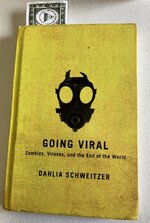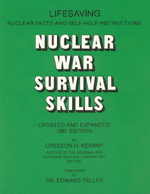Staff Member
Gold Supporter
Bronze Lifetime
- Messages
- 23,284
- Reactions
- 111,580
Very cool...anything that gets a kid interested in reading , history or preparedness is worth the time , effort and expense.
Andy
Andy
Follow along with the video below to see how to install our site as a web app on your home screen.
Note: This feature may not be available in some browsers.
I finished this one a few a couple months back. It was an interesting, well written overview, with one fatal flaw: the author's bias was undeniable. While that is true of most works, this one was glaring. Essentially the author provided good coverage of the groups opposed to Civil Defense, with nary a mention of groups, beyond naming some individuals and think tanks, that represented the other side. That includes one organization that has existed for around 60 years with the express mission of preparing for a major disaster. (This is one I have been a member of for years and have authored an article in their journal.) All and all, not bad, but still, hard to ignore the slant.Today I started reading Bracing for Armageddon: Why Civil Defense Never Worked, by Dee Garrison (Oxford University Press, 2006). It has been interesting thus far, though I didn't have much uninterrupted reading time.

(Admittedly, I rarely hit all the points, but it is the goal. This year has been decidedly mixed, but not bad considering the bonkers time-crunch in this foul year of our Lord, 2022.)
- Something human (e.g., sociology, history, anthropology, genetics, relationship dynamics, sexology, psychology, neuroscience, religion in various forms, shifts in cultural norms, et al.).
- Something machine (e.g., computer/computational science, genetic engineering, industrial topics, futurism, et al.). It can be germane to my occupation or not, though it is a benefit when it is.
- Something preparedness (e.g., civil defense, how tos/DIY, agriculture, security, history directly related to the topic, family preparedness, firearms-related, disaster recovery, et al.)
- Something whatever (e.g., a novel, a topic I'm interested in, a recommended work from a friend or colleague, etc.)
Today I started reading Bracing for Armageddon: Why Civil Defense Never Worked, by Dee Garrison (Oxford University Press, 2006). It has been interesting thus far, though I didn't have much uninterrupted reading time.
Downloaded this today and am already about 100 pages in (of 300+)...This book came in today:
View attachment 1287480
Going Viral: Zombies, Viruses, and the End of the World, by Dahlia Schweitzer (Rutgers University Press, 2018). May be interesting.

That is a good guide. Parenthetically, should it be of interest:Downloaded this today and am already about 100 pages in (of 300+)...
View attachment 1287698
Originally published in the late 70s, updated in the mid-80s (right before the fall of the USSR), updated once again in 1999. The manual's premise is that, despite all the regime/media propaganda telling us we'd all fry in a flash or freeze in an endless winter, none of those things are likely after effects of an exchange. City dwellers are most likely crispy critters, sure... but anyone away from major metro areas and/or military targets stands a fair to better chance of surviving if they take some basic precautions, the likes of which we talk about on here all the time.
How to DIY a geiger counter, basic shelter for the blast and immediate aftermath, 7/10 Rule for radioactive fallout, etc. It's all quite survivable...
My daughter bought me this as a spontaneous gift and I enjoyed it, but the section on firearm selection is atrocious and obviously written by someone who has little knowledge about firearms. I get that the book is a gag, but still.View attachment 1287711
It's been a couple years since I read it, but found it pretty interesting. Despite its fictional subject matter, the book covers quite a bit of practical information on survival preparedness if/when society collapses.